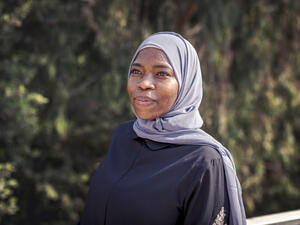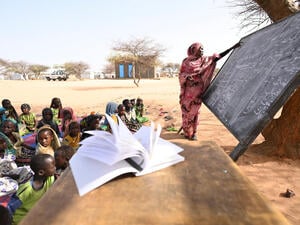Microsoft to provide learning centres for refugees
Microsoft to provide learning centres for refugees

Demonstrating the refugee registration system developed by Microsoft at the UN World Summit on the Information Society in Geneva.
GENEVA, Dec 12 (UNHCR) - International software manufacturer Microsoft today signed an agreement with the UN refugee agency to establish two facilities, in Kenya and Russia, where refugees will be able to learn valuable computing and software skills.
UN High Commissioner for Refugees Ruud Lubbers and Microsoft's Chief Executive Officer for Europe, Middle East and Africa, Jean-Philippe Courtois, met in Geneva Friday and signed a letter of understanding on Community Technology Learning Centres that Microsoft will fund to provide training and computer education for refugees.
The two centres planned under the pilot phase of the joint agreement will be fully funded by Microsoft. They will be located at Dadaab refugee camp in eastern Kenya, and in St. Petersburg, Russia.
Courtois said the projects are aimed at disadvantaged communities. "It's about digital inclusion, social inclusion and economic inclusion," he added.
In the mainly Somali refugee camps of Dadaab, the centre will provide basic education to school children and information technology (IT) skills-training to older refugees.
More than 120,000 refugees live in eastern Kenya's Dadaab camps, located about 100 km from the Somali frontier. The Somalis fled their homeland more than 10 years ago. They have been encamped in the remote desert region with little contact with their homeland, or anywhere else, ever since.
Meanwhile, the learning centre to be established in St. Petersburg is expected to benefit some 6,000 mainly Afghan and Iraqi refugees. Urban refugees living in Russia's main Baltic port city will use the computers for IT skills-building and other hardware/software skills training.
High Commissioner Lubbers said refugees in both locations would also benefit by using the computers to seek out news about their homelands, helping them to stay in touch with their home countries, as well as their family and friends.

Microsoft's Jean-Philippe Courtois (left) and UNHCR's Ruud Lubbers signing the letter of understanding on Community Technology Learning Centres for refugees.
"The people involved will learn practical aspects of new technology, and that will enable them to become successful citizens," Lubbers said at the signing ceremony, which took place on the sidelines of the three-day UN World Summit on the Information Society in Geneva.
While many states around the world lack reliable postal systems, the Internet is an increasingly important communications tool, making IT skills crucial as war-ravaged countries like Afghanistan, Iraq and Somalia slowly rebuild.
The UN refugee agency's cooperation with Microsoft began during the Kosovo crisis in early 1999, when hundreds of thousands of people fled into Macedonia and Albania, many after having their identify documents confiscated or destroyed.
In response to the enormous need for identification documents, Microsoft provided software and hardware and helped UNHCR to assemble kits to register and photograph refugees and produce simple ID cards. Other IT firms also provided valuable assistance and components, and more than 100 registration kits were eventually deployed also to Africa and parts of Asia to help UNHCR improve its global refugee registration policies. Microsoft has also donated consulting services in support of a new global registration system UNHCR expects to launch in mid-2004.
"Our partnership began from the bottom up. It started with our people on the ground who wanted to become part of the solution, to make a difference," Courtois said. "We wanted to help people in Kosovo recover their identity."
From that early beginning in the midst of a refugee exodus, the two global players in software and humanitarian assistance have expanded their contacts to provide new, innovative services to refugees. This is expected to expand as the Community Technology Learning Centres move beyond the pilot phase.








